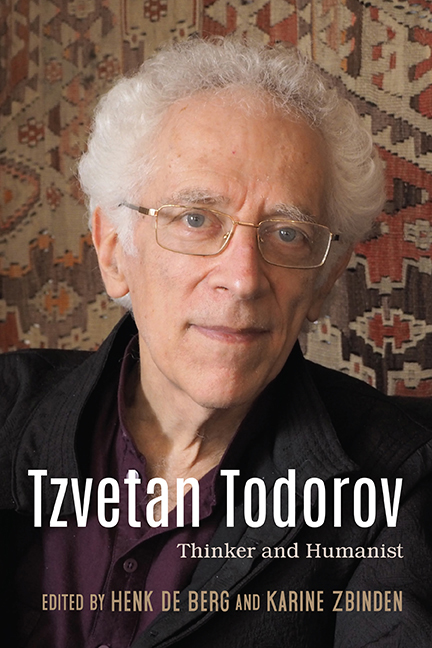Book contents
- Frontmatter
- Contents
- Acknowledgments
- Introduction
- 1 A Marginal Centrist: Tzvetan Todorov and the French Intellectual Field
- 2 Todorov and Camus
- 3 The Enlightenment Redux: Autonomy in Todorov, Glucksmann, and Onfray
- 4 Todorov's Reading of Rousseau: A Heritage for Our Times?
- 5 Tzvetan Todorov's Enlightenment
- 6 Todorov and Bakhtin
- 7 Tzvetan Todorov and the Writing of History
- 8 Tzvetan Todorov and the Trials of History: A Dissenting Voice
- 9 European Integration and the Cultural Cold War: Todorov and Denis de Rougemont
- 10 Tzvetan Todorov on Totalitarianism, Scientism, and Utopia
- 11 Tzvetan Todorov's Political Philosophy
- 12 Interview with Tzvetan Todorov
- Notes on the Contributors
- Index
7 - Tzvetan Todorov and the Writing of History
Published online by Cambridge University Press: 26 April 2020
- Frontmatter
- Contents
- Acknowledgments
- Introduction
- 1 A Marginal Centrist: Tzvetan Todorov and the French Intellectual Field
- 2 Todorov and Camus
- 3 The Enlightenment Redux: Autonomy in Todorov, Glucksmann, and Onfray
- 4 Todorov's Reading of Rousseau: A Heritage for Our Times?
- 5 Tzvetan Todorov's Enlightenment
- 6 Todorov and Bakhtin
- 7 Tzvetan Todorov and the Writing of History
- 8 Tzvetan Todorov and the Trials of History: A Dissenting Voice
- 9 European Integration and the Cultural Cold War: Todorov and Denis de Rougemont
- 10 Tzvetan Todorov on Totalitarianism, Scientism, and Utopia
- 11 Tzvetan Todorov's Political Philosophy
- 12 Interview with Tzvetan Todorov
- Notes on the Contributors
- Index
Summary
DESPITE THE PROMINENT PLACE that Tzvetan Todorov accords to history in his writings, his reflections on critical issues in historical theory and historiography have never attracted much attention. I will argue in this chapter that one reason to attempt a reconsideration of Todorov’s work on the relationship between history, morality, and ethics is that it promises to contribute to recent discussions regarding the “advantages and disadvantages of history for life” (to borrow Nietzsche's phrase) as well as to renewed debates about what it means to engage in a dialogue with the past. In contrast to those scholars who insist on the importance of studying the past as an end in itself, a growing number of critical researchers have stressed the need for a more practical orientation to the past, one that allows us to draw moral and political lessons from past experience and thus use the past as a guide for present and future action. It is in this context that Todorov's revival of the genre of “exemplary history,” as well as his meditations on the uses and abuses of historical memory, merits closer consideration.
Exemplary history is most closely associated with that older topos according to which history is the great teacher of life, historia magistra vitae. Coined by Cicero, this adage not only pointed to the connection between history and moral philosophy; it also connoted a belief in a usable past and assumed a view of history as a storehouse of exempla, a kind of “reservoir of multiplied experiences which the readers can learn and make their own.” Indeed, as Hayden White reminds us, ever since its inception with Herodotus and Thucydides, history has been primarily conceived as a pedagogical and practical discipline that promoted the study of the past “as a propaedeutic to a life in the public sphere.” Similarly, during the early modern period Renaissance humanists not only viewed history as a kind of applied ethics; they also believed that the ultimate purpose of historical writing was to teach lessons and supply models of comportment for human beings, providing both positive examples for readers to emulate and negative ones for them to avoid.
- Type
- Chapter
- Information
- Tzvetan TodorovThinker and Humanist, pp. 127 - 146Publisher: Boydell & BrewerPrint publication year: 2020

